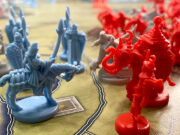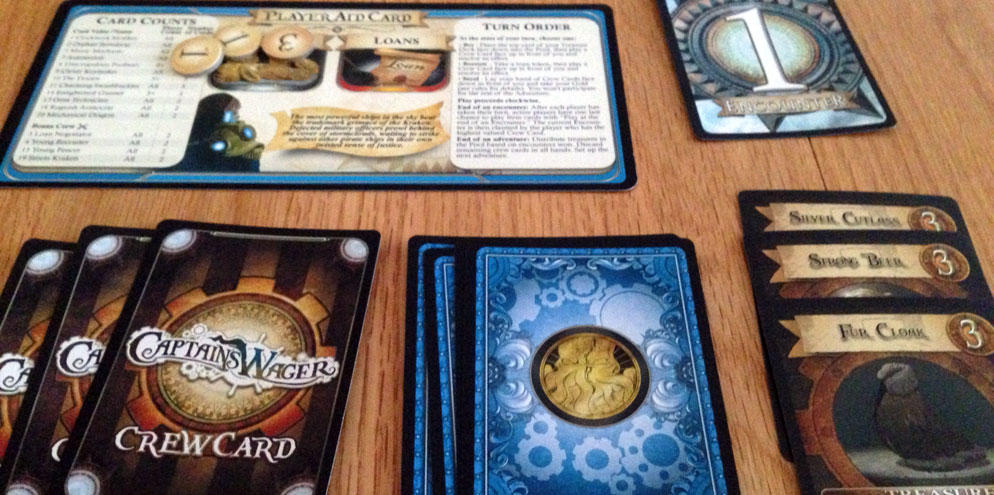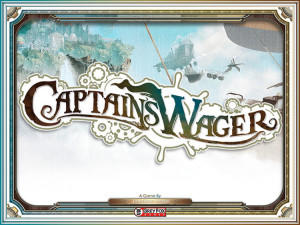 I used to really enjoy playing card games of chance like Poker. There was no better feeling when you won the pot with a great hand or bluff. It’s harder now to find the time to get friends together to play given everyone’s schedules and “adult” responsibilities. So when I was offered the chance to play and review, Captain’s Wager, a hand management card game of chance from Grey Fox Games, I pounced on it. Does Captain’s Wager stand up to other games from my past or should you pass? Read on!
I used to really enjoy playing card games of chance like Poker. There was no better feeling when you won the pot with a great hand or bluff. It’s harder now to find the time to get friends together to play given everyone’s schedules and “adult” responsibilities. So when I was offered the chance to play and review, Captain’s Wager, a hand management card game of chance from Grey Fox Games, I pounced on it. Does Captain’s Wager stand up to other games from my past or should you pass? Read on!
Captain’s Wager is a hand management card game for 2-5 players and plays between 25–30 minutes. Captain’s Wager plays best with 4-5 players.
Game Overview:
The game’s overall theme and object is straight-forward and unique. You play a Steampunk airship pirate captain who sends their crew on adventures in search of loot. Unfortunately, several captains show up for the same adventure. The only way to determine who wins the largest share of the loot is of course to gamble. That’s the pirate way! Each Captain will wager their own gold that their crew will be best. The captain with the most gold at the end of the last adventure wins the game!
Game Components:
Captain’s Wager comes with good components. All tokens, markers, and cards of quality and should hold up for replay. I would definitely add card sleeves to the Crew and Treasure decks. These two decks will see the most use during the game, especially the Crew deck. The Encounter cards could use sleeves but it’s not a must have. All components are detailed in four-color and most carry steam punk images and art.
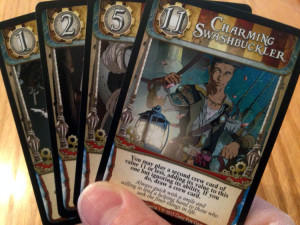
The Player Aid Cards are packed with great materials outside of the rule book itself. It provides a card counter (wish I had these in poker) of the number of the various crew cards and values. It also gives a handy Turn Order overview and a place to hold Gold and Loan Tokens. The Player Aids are identical for each player except that they are a unique color and give a description of 1 of the 5 pirate clans. My only complaint is that it’s the same card stock as the standard card decks and its unique size makes it hard to find a card sleeve to fit it, unless you have a laminator. A thicker stock would have made more sense.
It’s worth noting that the rule book is organized well with rules that are presented clearly so this was an easier game to learn and teach. My favorite feature of the rulebook was the glossary of terms. Every Crew Item Effect, or player action has a definition which most players can reference without giving away what they might be holding. Overall, I wish more games did this and it’s a nice reference during play.
I think the biggest plus in the overall components was the artwork. From the rule book to the cards, the artwork is a great representation of the game’s theme. Do you have to have the art and this specific theme to enjoy it? No. But this adds a nice aesthetic that the old school card games lacked, or maybe it’s purposeful to distract a weaker captain with images as you make a grab for more of the loot.
How to Play:
As mentioned above, each player controls a pirate ship. During set-up, players will shuffle their identical deck of Treasure cards and place it facedown, shuffle the Crew deck for all players to draw from, and randomly assign the first player token. There will also be two supplies of gold and loan tokens for players to draw from.
1. Adventure Setup: 3 encounter cards will be placed face-up for all players to see. The game has basic encounter cards that are simply numbered 1-3 or “bonus” encounter cards that give a reward to those players that claim them. Each player draws 4 crew cards starting with the first player, and then each player antes by taking 1 card from their Treasure Deck and placing it face-down in the center of the table to the treasure pool.
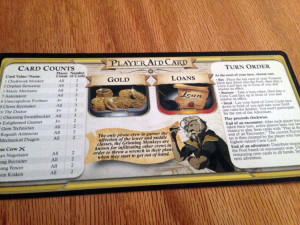
2. Play Encounters: There will be 3 encounters per adventure. Each encounter will be resolved individually and players will take their turn by choosing one of the following actions:
Betting: A player can take the top card of their treasure deck and place it face-down in the treasure pool. They will then play 1 crew card face-up in front of them and resolve its effect (if any).
Borrowing: A player can take a loan token (each is worth -2 gold at the end of the game) instead of drawing a treasure card. They will then play 1 crew card face-up in front of them and resolve its effect (if any).
Stealing: A player can lay all their Crew cards down and no longer be active in the adventure. But the player will take a reward of gold tokens (varies by player steal order and player number) and then draw the top most card from their Treasure deck to their hand. It’s worth noting that treasure cards played to your hand become item cards that can be played during the encounters.
The end of the encounter is resolved by players comparing the crew values and then resolving any item card effects played at the end of the encounter. The player with the highest value claims the encounter card. If players tie then no players claim the encounter card.
3. End of Adventure: If a player claims 2 of the 3 encounter cards they win the treasure pool. If no one claims 2 encounter cards then starting with the player with the card #1, the treasure is distributed between players with encounter cards.
Each player that claims treasure from the pool can look and choose 1 to put in their hand and the rest are placed face-up in front to them. All face-up treasure cards are considered “claimed” treasure and will use the card value for scoring at the end of the game.
4. Check for End of Game: If all players have at least 1 card in their treasure deck, then players will start a new adventure. Players will discard their remaining crew cards, pass the first player marker, and return to Adventure Setup.
If at least 1 player has no cards in their treasure deck, then the game ends and final scoring takes place. The player with the highest gold value from cards or tokens wins and receives the title of Pirate Admiral!
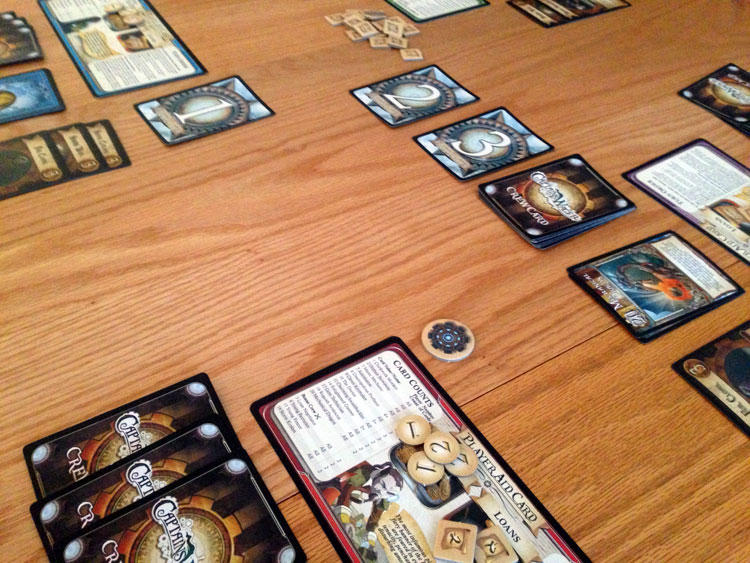
Game Experience:
As I stated earlier, I love games of chance and out of the gate Captain’s Wager gave me an immediate Poker feeling. You have many actions like betting and ante taken directly from almost any Poker game and some that are not, but overall this is a good game of chance. Now, the Poker comparison thins because there’s no real bluffing or a raise, hold, or check betting options, but there is still a definite Poker feel to Captain’s Wager that I enjoyed.
There are two player turn options that I really liked that added balance to the game. First is the Borrow option which is not Poker-like but it’s cool a mechanic nonetheless. So, if you have a hand of low crew values, then this option allows you to play a crew card and hope you can use the card’s effect or use on future encounters. This way you don’t have to sacrifice your Treasure cards but you do gain a Loan Token. Never fear though, there are crew and item effects that discard or reassign Loan Tokens to other players.
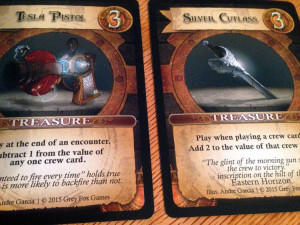
The second is the Steal option; a personal favorite. It allows you to get a reward of gold and an item but don’t lose your own treasure. Now the cost of stealing is high because you don’t act anymore in the Adventure. I think why I like this option so much is that it allows players to get some gold and an item to their hand even though they had no chance to claim the encounter card(s) or even win treasure pool.
The last mechanic that I liked was the Treasure Deck and that this deck was the game timer. What was great is that each player has the same cards and number, but what they or other players do with the deck will determine how long the game goes. Plus unused, claimed, or Item Cards (Treasure Cards in your hand) can be counted for end of game scoring so there’s almost always a value to have treasure cards. Overall the deck’s multi-use was a slick aspect of the game.
This leads me to a mechanic that I found problematic, the Bet option. Overall it works fine as noted above. The issue comes when a player has no Treasure Cards and still is allowed to bet. That player can play a Crew Card and other players get 1 Gold Token from the supply. I found this totally flawed since you had two other options, Borrowing and Stealing, so I don’t understand why you can Bet without treasure cards. Plus, giving 1 Gold Token to each other player is a poor reward given that Treasure Card gold values range from 2-4 and that player has a chance to win the treasure pool. This will only occur during the last encounter but it nonetheless is a flaw in my opinion.
The only other two negative aspects of Captain’s Wager are that the game can become a run away and the luck of the draw has significant effect. The players who win 2-3 treasure pools will most likely win the game. Most games using just basic cards will last 4-5 adventures. So, when you win a Treasure Pool, the amount of treasure cards and gold value will be significant plus choosing an item to add to your hand can put the game out of reach for players who lose. This can discourage players because they will be playing catch-up or might lose interest if the game seems out of their reach.
The last aspect some players will suffer through is the luck of the draw. This is significant for Captain’s Wager. Unlike Poker, you can’t bluff your way through having bad or low cards. All Crew Cards are face up and so other players can easily see what you have and you can only change the outcome with Card or Item Effects. I have no answer for the luck of the draw except to play through it.
Final thoughts:
The designers did a great job emulating a Poker like experience. I would suggest a tweak to the betting rules to give the game better balance, but there are other player options that do help to balance the game play. The overall rules in Captain’s Wager are straight-forward and rule book is an excellent reference guide. While it can be somewhat frustrating if you’re not in the lead or luck is not on your side, there’s still enjoyment to be had.
I think most gamers looking for a hand management game of chance will enjoy Captain’s Wager, but Poker purest will likely stick with their old school deck of cards and house rules.
If you are interested in getting a copy of Captain’s Wager, you can pick it up for about $25.
Final Score: 3.0 Stars – A good hand management card game of chance that is easy to learn and play.
 Hits:
Hits:
• Steal & borrow rule options help game balance
• Treasure deck determines game length
• Great artwork
Misses:
• Betting rule option not balanced
• Can easily become a runaway
• Luck of the draw is significant in the game




